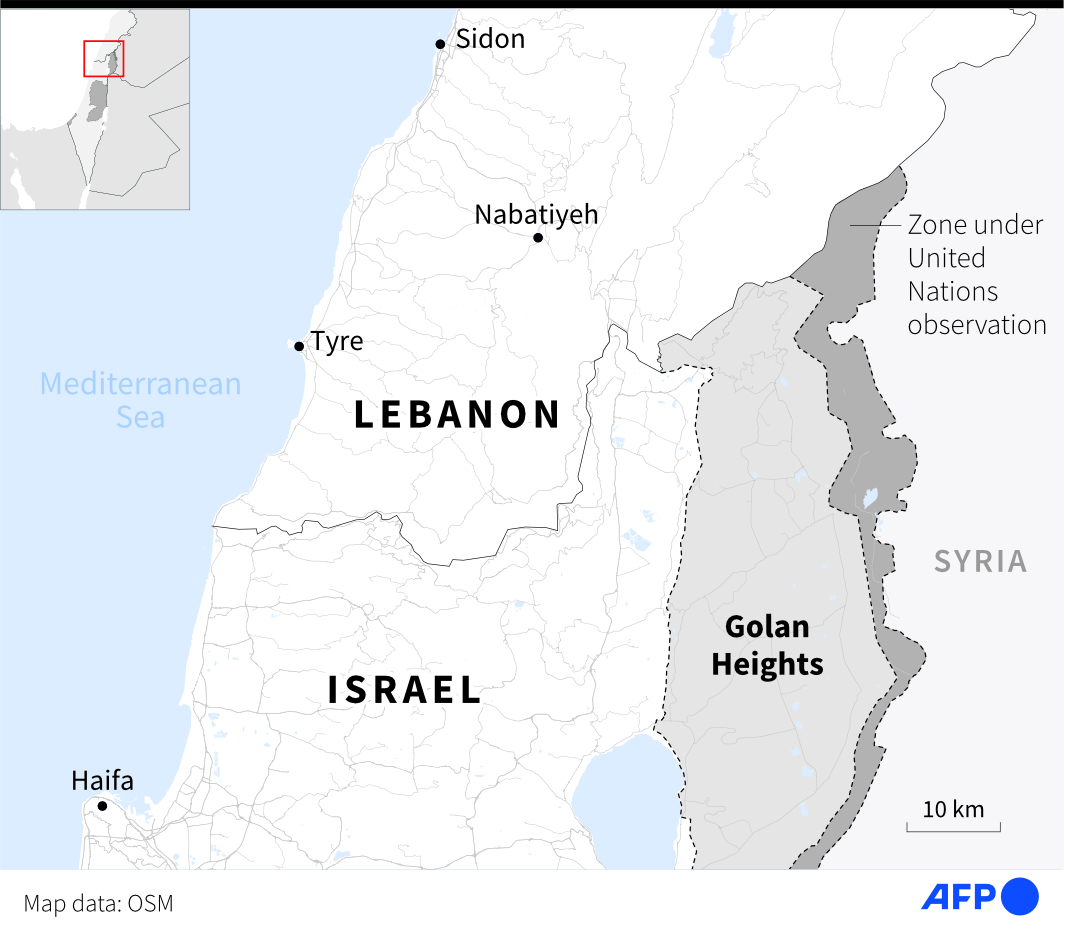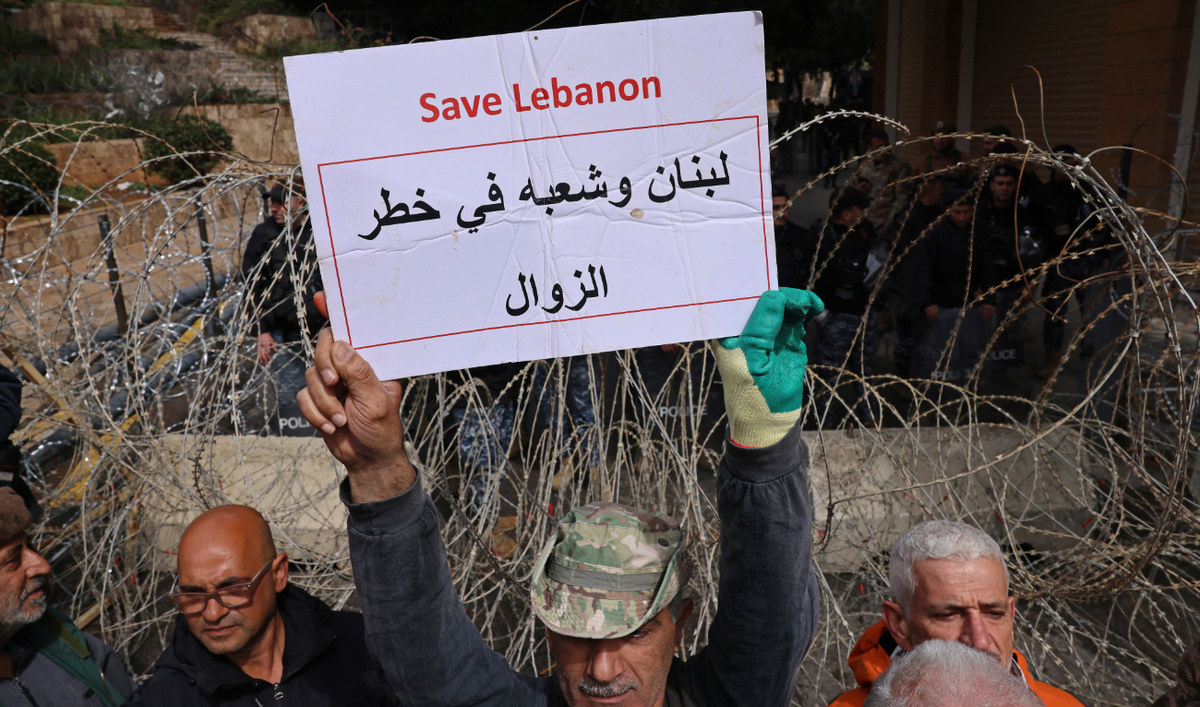DUBAI: As Hezbollah and Israel continue to engage in cross-border attacks, which began with the start of the war in Gaza last year, regular Lebanese citizens find themselves surviving in an atmosphere of tension and uncertainty.
Israel so far has stopped short of opening a second front in Lebanon while it seemingly implements a scorched-earth policy in Gaza in retaliation for the deadly attacks Palestinian militant groups led by Hamas carried out in southern Israel on Oct. 8 last year.
The tit-for-tat exchanges have grown in intensity, with two Israeli civilians killed by a Hezbollah rocket barrage in the Golan Heights on Tuesday. Just hours prior to this, an Israeli strike in Syria killed a former bodyguard of Hezbollah leader Hassan Nasrallah.

The death toll in south Lebanon continues to mount with more than 435 people killed and over 96,000 internally displaced, according to data from the UN Office for the Coordination of Humanitarian Affairs.
There has also been a steady rise in the number of senior Hezbollah officials being assassinated. The most recent of these was Mohammed Nimah Nasser, commander of the Aziz Unit responsible for the western sector of southern Lebanon.

A man stands next to a Hezbollah party flag jammed into the wreckage of a vehicle near buildings destroyed during previous Israeli military fire on the southern Lebanese village of Aita Al-Shaab, near the border with northern Israel on June 29, 2024. (AFP)
Lebanon is already weighed down by the combined impact of economic collapse, soaring poverty and political dysfunction. With no diplomatic breakthrough achieved so far in efforts to contain hostilities between Israel and Hezbollah, many live in fear of an all-out war, a scenario that could prove further devastating.
Lebanon has also been without a president for nearly two years, relying on Najib Mikati’s leadership as caretaker of the government. Unending quarrels and shifting alliances within parliament make critical decision-making impossible, while rampant corruption remains the status quo.
According to the May 2024 Lebanon Situation Report from the World Food Programme, the country’s food security has deteriorated rapidly, with the report predicting that just under a quarter of the population will be food insecure by September 2024.
Lebanon’s poverty rates have more than tripled over the past decade, with another May report from the World Bank finding that 44 percent of the total population now lives in poverty.

People line up in front of a bakery to buy bread in Lebanon’s southern city of Sidon on June 22, 2022. (AFP)
Conditions have compelled households to undertake a variety of coping strategies that include cutting back on food consumption, non-food expenses, and health expenditures, which will likely lead to severe long-term consequences.
More than half the population also now depends on aid for survival while the rest continue to struggle to secure basic life necessities such as fuel and electricity.
On July 2, Walid Bukhari, Saudi Arabia’s ambassador to Lebanon, announced an aid package of $10 million through the King Salman Humanitarian Aid and Relief Center.
The aid will help launch 28 projects across Lebanon, adding to the 129 relief, humanitarian, and development projects KSrelief has implemented in the country to date.

A World Bank report in May said that 44 percent of the total population in Lebanon now lives in poverty. (AFP)
Bukhari said the Saudi support was a continuation of the “commitment of the leadership in Saudi Arabia to help humanitarian efforts and promote stability and development in Lebanon with the highest standards of transparency and accountability.”
He also said the support is a “solidarity approach adopted by the Kingdom toward the Lebanese people, based on the duty of true Arab brotherhood and teachings of Islam.”
While gestures are often appreciated by the Lebanese public, many remain skeptical of their own government’s ability to distribute the aid evenly and fairly.

In July, Saudi Arabia announced an aid package of $10 million for Lebanon through the King Salman Humanitarian Aid and Relief Center. (SPA/File)
Joseph, a 40-year-old Lebanese from Jounieh who did not want his full name to be used, said he was doubtful that the ones in need would see a cent from any aid packages.
“We have vultures, not politicians. We would not be in this predicament if we had decent leadership,” he told Arab News.
INNUMBERS
- 435+ People, mostly combatants, killed in south Lebanon since Oct. 8, 2023.
- 96,000+ People internally displaced in south Lebanon during the same period.
- 200+ Drones and rockets fired at Israel from Lebanon in first four days of July.
Another Lebanese citizen, who also did not want to reveal his full name, also likened the situation in the country to a tale of two cities.
“The ones who are well off are always out and about in Beirut in areas like Gemayze and Mar Mikhael where most of the pubs are,” Samer told Arab News.
“They have no notion of war, nor do they fear one, because they know they can leave. The others who have fallen on hard times are at home trying to figure out ways to make do at the end of every month. Everyone is talking about the US elections and what outcome it will have on our country.”
Joseph said that a growing number of his friends and family members have begun taking sedatives just to continue functioning.
“The uncertainty has everyone in a chokehold. We had problems prior to the Gaza war and now we’re caught in the middle, not knowing what might become of us and our jobs. We have become hostages in our own country.”

A Lebanese protester holds a sign as fuel tankers block a road in Beirut during a general strike by public transport and workers unions over the country’s economic crisis, on January 13, 2022. (AFP)
Since Lebanon has no adequate social safety net, mental health services range from unaffordable private care to support from local and international nongovernmental organizers that offer free or low-cost consultations.
A study done last year by the mental health NGO Embrace showed that the suicide rates in Lebanon are among the highest in the last 10 years, having increased by 21 percent since 2022. Over 81 percent of suicide cases involved men, with young people aged 23 to 32 the most at risk.
Lebanon’s economic collapse, the 2020 Beirut port blast, and the effects of the COVID-19 pandemic, compounded by war speculation and uncertainty, have taken a heavy toll on its citizens’ mental health.

More than half the population in Lebanon now depends on aid for survival while the rest continue to struggle to secure basic life necessities such as fuel and electricity. (AFP)
This week, a mental health strategy was launched in collaboration with the World Health Organization. Dr. Rabih Chammay, the head of the National Mental Health Programme in Lebanon, said that strengthening mental health during crises is a top priority.
The National Mental Health Strategy 2024-2030 will aim to reform and ensure mental health services to those in need for a minimal cost.
Beirut-based Majed, 34, who works both in and outside Lebanon, does not see any signs of impending war except for high-risk areas like the south and Bekaa Valley.
“I also think it depends on where you stay in Lebanon, but I would assume conversations in communities that live in and around Beirut might have a different case.
“But we are seeing precautionary measures in case an all-out war takes place. I think everyone hopes that things will de-escalate but know there’s a good chance a war might happen.
“Even if people don’t live in high-risk areas, this would impact them in so many ways: in terms of their ability to travel if the airport gets hit, availability of fresh produce for people to be able to eat, and we’ll definitely see an increase in crime, especially in the cities.”

A Hezbollah fighter is seen standing at attention in an orange field near the town of Naqura on the Lebanese-Israeli border on April 20, 2017. (AFP/File)
Citing his family’s preparation, Majed said: “My mother keeps talking about leaving Beirut and going to stay in the summer house in Chouf. She also is keeping it fully set up in case a war breaks out. She has bought an additional freezer and is now stocking it up.
“Dual citizens will rely on evacuations, especially if they come from America or European countries. I guess in such a situation, optionality is a privilege.”
To date, seven countries have called on their citizens to leave Lebanon and avoid traveling there, while five countries warned their citizens to be alert and avoid certain areas.

A house lies in ruins in the border area of Shebaa in southern Lebanon, following an Israeli strike on April 27, 2024. (AFP)
In retaliation to the killing of its senior commander Nasser in Tyre, Hezbollah has so far launched 200 rockets and drones into northern Israel.
As violent standoffs between the two powers continue to mount, civilians in southern Lebanon are war-weary but on guard. For Lebanese Ali Shdid, however, the current situation has become a reality of life that one ought to make peace with.
“No one wishes for war. No one. But we will not be threatened into submission, nor will we cower,” he told Arab News.
“If Israelis think we will cave due to their threats and bravado, they got it twisted. We will welcome war on all its fronts.”






























